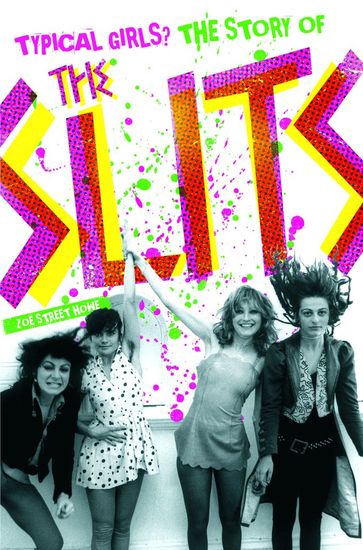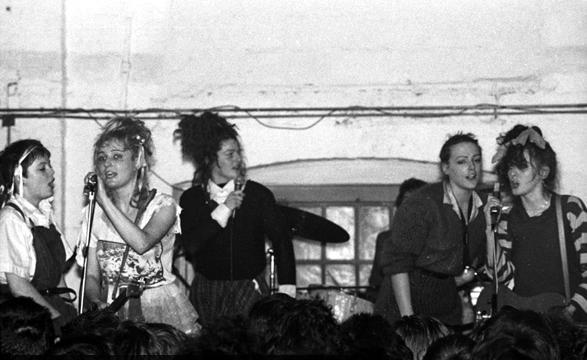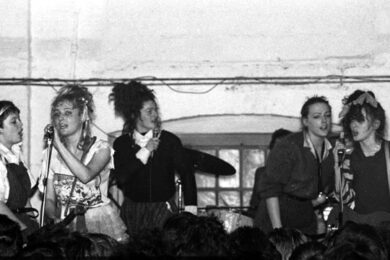I waited for ages for someone to write a book about The Slits. Deep down I wanted to write it myself, but thought it was probably someone else’s job. I loved their strange, funny, experimental sound and look, and was inspired by, from what I’d read in the odd interview, their refusal to label themselves ‘feminist’, or even ‘punk’. I wanted to know more, so I waited for the book that no doubt was going to be written about them. After a while I thought, ‘Oh sod it, I’ll do it myself DIY punk-style.’
It was 2006 and I liked the idea that the 30-year anniversary of Cut was coming up – it gave me a self-imposed deadline, which was a major factor in making me get on with it.
Initially, the book was mainly going to concentrate on the album with a bit of biography to contextualise it. But the more I spoke to people, and the more fantastic stories and figures and previously unspoken feelings were coming out, the more the book evolved into something which would be a celebration and insight of their career during that punk/post-punk era. Cut, as founding Slits-member and Mo-Dette guitarist, Kate Corris, observed in the book, was a watershed for The Slits, and to take it in isolation wouldn’t have worked, as comparatively little had been written about the group’s journey in the first place. I’m glad it turned out this way, as a more complete look at those five insane years for The Slits in the late 1970s and early 1980s. Cut is still very much at the heart of it though.
Don Letts was the first interviewee, a long-time pal of The Slits and the man who attempted to ‘manage the unmanageable’ when The Slits joined The Clash’s White Riot tour. So as someone who was there from the beginning, his perspective was a great place to start. He in turn introduced me to Tessa Pollitt, who was shy but positive and soon became a very pro-active fairy godmother to this project. For that I’ll always be grateful. She was also open and philosophical about some of the darker times the Slits experienced, including an overdose and her issues with heroin.
I met Ari Up soon after, as, serendipitously, she was in the UK for one of her solo gigs with the True Warriors. She was lovable, intimidating, excitable and cautious all at the same time. Which was understandable. She told me that she also wanted me to organise a Slits convention, like a Star Trek convention. I quite liked the idea of loads of very serious-looking people of all shapes and sizes turning up, and instead of wearing Spock ears and so on, they’d be covered in mud and have socks in their hair. Something for the future perhaps… Ari gave a great interview – which included a sad story about how Bob Marley bigged up The Slits in ‘Punky Reggae Party’, only to whip their name straight out when he discovered they were female.
Kate Corris, who formed the group with Palmolive, offered unique insights and colour to the part of the book that concentrates on their early period. But the guitarist who replaced her, Viv Albertine, who many hail as the eventual driving force behind the group, was believed to be the one who wouldn’t want in with this project. After Ari asked her to reform the group several years ago, she gave it a miss in no uncertain terms. After the traumas The Slits experienced just trying to do their thing in a man’s world, she seemed keen to put it behind her. But I must have caught her at the right time, and thanks to the Slits’ former manager and general diamond Christine Robertson, I was soon eating toast and cuddling the cat in Viv’s seaside home. This was around the time she decided, after all these years, to start playing and writing again. I linked her up with Tessa at a Carbon/Silicon gig in the heartland of Ladbroke Grove, and she subsequently played with the ‘new’ Slits for two gigs, before doing her own very interesting thing, with, as it happens, me. I’m the sort of Vince Clarke character with a keyboard and toy instruments etc.
It seemed the process of writing the book had in some part prompted the reconnection of people who’d either fallen out or thought they’d fallen out, which I thought was a beautiful thing: Viv hooked up with Ari and Tessa again, Ari got back in touch with Poly Styrene, Viv got back in touch with Keith Levene and so on. It was exciting.
All in all the process was positive, save a few crazy moments. But what did I expect? This was The Slits, one of the most chaotic bands from one of the most chaotic scenes. It was always going to be extreme. But I passionately felt that they deserved more recognition, because most people are only aware of a fraction of what they achieved.
After writing this book, I became inspired anew by them and their comrades, and I hope those who read it feel the same motivating effect. I’m not saying I hope you all go off and piss on the stage during a gig, roll naked in freshly watered flowerbeds or forcefully rearrange hotel fixtures, although go for it, obviously, if the mood strikes. But their real potency lies in their freedom of thought, their creativity, and the determination they had to go their own way and be themselves without playing up to ideals, to try new things bravely and joyously, with humour and a sense of fun, as opposed to anger. Anger is an energy, of course, as John Lydon would say, but it’s refreshing to also see the honesty, oddness and sheer glee these people had in experimenting musically without fear of judgment – they were into free jazz, free improv, funk, German opera, reggae of course and African music, and while they dabbled, often naively, with these influences for themselves, the result would always be their own sound, which often sounded as if it had come from space as much as it did the streets of west London.
I wondered, when I first embarked on this, whether I’d end up totally saturated by the subject, but now, having a greater insight into the group, they seem more interesting and inspiring than ever, as does everyone I managed to speak to. Even after this intense period holed up working, checking, agonising, losing sleep, and hair, I’m afraid, the result still sparkles merrily in blazing technicolour thanks to the characters that populate it.
The ordinarily elusive Keith Levene was a generous, articulate interviewee, powered by chocolate from the sweet shop below (they gave him a huge bag for free, who knew Mrs Kibble’s Olde Sweet Shoppe’s staff were into PiL?) and was supportive throughout the whole journey, as was the ebullient Punk Professor herself Vivien Goldman. Adrian Sherwood kindly gave his time for the book despite having just flown from somewhere far-flung and being seriously jet-lagged. I even reached Budgie, thanks to Viv tracking him down. I’d previously tried to contact him via someone else, and ended up assuming he wasn’t interested. It turns out he never got the message. And thank goodness we did link up because, despite braving man-flu at the time, he was a lovely interviewee who offered a different view, as someone who was initially a kind of Slits super-fan who ended up augmenting them beautifully on their (arguably) most important recording. He also had some amusing anecdotes, one of which involved them all ending up in one bed. Calm down, it’s not how it sound.
I was lucky to be able to include many people who were involved with The Slits: Dennis Bovell (who also taught me how to cook breadfruit), Palmolive and the Raincoats, all of whom were great. Not everyone was a sweetie though. One writer, who I respected greatly, cancelled our interview, branding me a ‘rude sexist’ when she saw one question enquired, for chronological reasons, whether she met the Slits during the time she was dating a mutual friend, who was on tour with them at that time. I wasn’t actually very interested in their relationship per se – it’s a pretty famous one anyway – I was just getting my head around timing. It was an impressive over-reaction to an innocent question and a real pity. This has been a hell of a learning curve about people, if nothing else.
Mick Jones was up for an interview, but our paths didn’t cross in time unfortunately. Chris Blackwell was impossible to reach, but now I know he’ll have been busy blowing up balloons and arranging the cheesy pineapple for the Island 50 celebrations…
Tony Fletcher, who wrote the Keith Moon book, Dear Boy, observed that while people say writing a book is like having a baby, he reckons it’s like having a baby and bringing it up. I agree. When it launches, I’ll sniffle as I peek at it in Waterstone’s, as if on its first day at school – although in this case, I’ll be more than happy if a stranger picks it up and takes it home.
Typical Girls? The Story of The Slits is out in paperback July 6th 2009, published by Omnibus Press.




